Rebuilding ‘Black Panther’: How the ‘Wakanda Forever’ Family Fought Through Grief and Injury to Create a $250 Million Superhero Tribute
- Oops!Something went wrong.Please try again later.
- Oops!Something went wrong.Please try again later.
- Oops!Something went wrong.Please try again later.
- Oops!Something went wrong.Please try again later.
- Oops!Something went wrong.Please try again later.
- Oops!Something went wrong.Please try again later.
- Oops!Something went wrong.Please try again later.

Ryan Coogler can’t sit still.
When the 36-year-old filmmaker first joins Variety to talk about his latest movie, Marvel Studios’ “Black Panther: Wakanda Forever” — the $250 million sequel to “Black Panther” — it’s at the end of an exhausting day of press interviews in late October. He ambles into a hotel suite that’s been mostly emptied out for this conversation, and as he sinks into a couch that’s much lower than any of the other chairs in the room, his puzzled expression makes clear that he’s not happy with the ad hoc surroundings.
More from Variety
“It’s a little weird,” he says. “Is there another place we could do this? Could we sit at a table or something?”
A table is quickly wheeled in as Coogler pulls the curtains back along a row of windows to let in more light. “I felt claustrophobic; it didn’t feel like we were equals,” he explains. “I just want to have a normal conversation with people.”
That’s been hard to come by of late.
“Wakanda Forever” represents the collective efforts of a tightly knit family of filmmakers working under unimaginably difficult circumstances. On Aug. 28, 2020, the franchise’s lead actor, Chadwick Boseman, died of colon cancer at 43, when Coogler was still developing the screenplay for the sequel; it was an overwhelming loss that also forced a major overhaul of the story. After cameras finally started rolling 10 months later, the production was derailed again when its new star, 29-year-old Letitia Wright, suffered devastating injuries on set, putting the shoot on hold for several months, followed by headlines alleging that she was unvaccinated for COVID-19.
None of this was how making the sequel to one of the most meaningful cultural sensations of the new century was supposed to go.
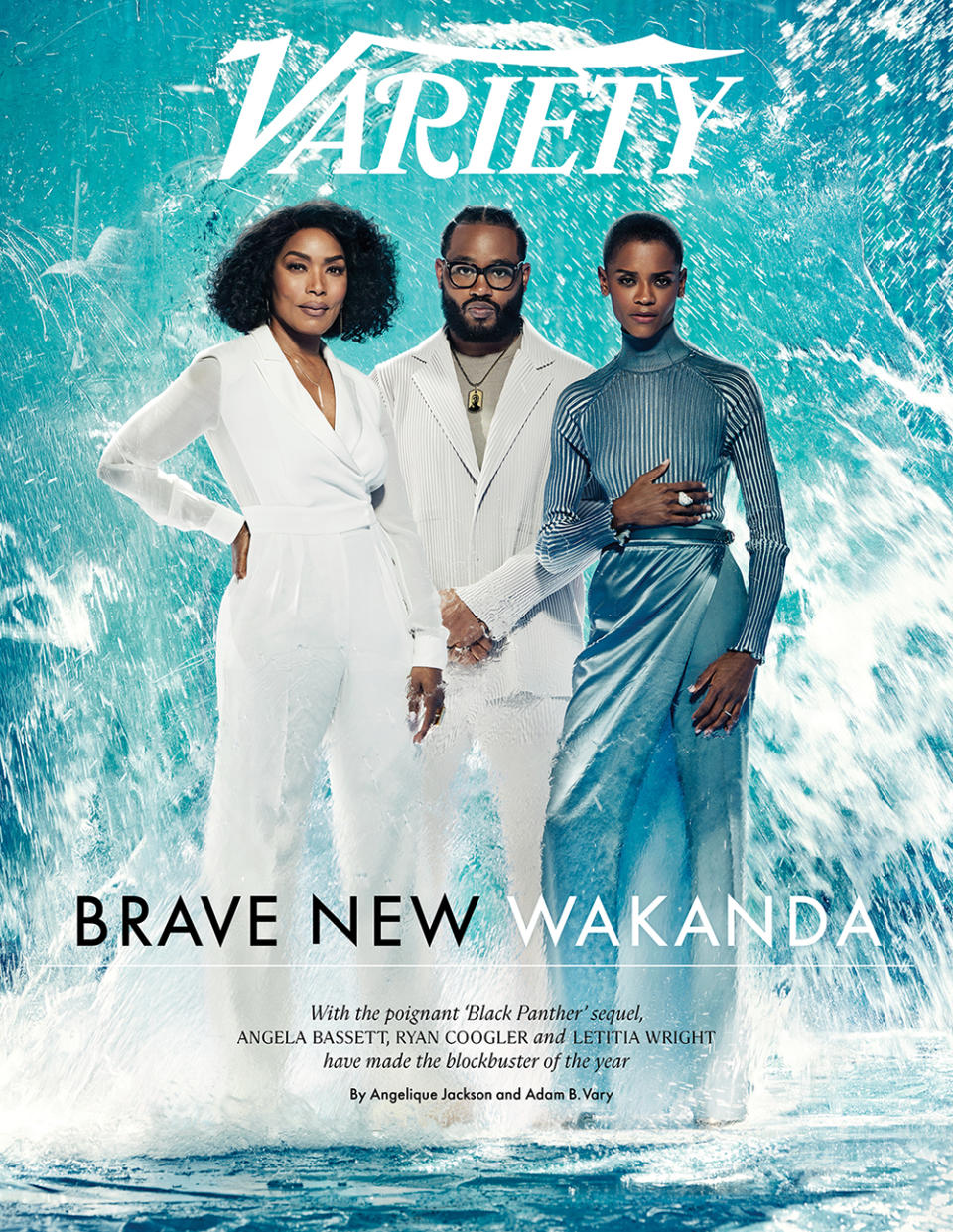
When “Black Panther” opened in 2018 to record-breaking box office grosses, ultimately banking $1.3 billion worldwide, it eviscerated the pernicious lie that movies with predominantly Black casts cannot perform on a global scale, and it did so by bringing to life an exhilarating vision of the African nation of Wakanda as the most technologically advanced society in the world. Then “Black Panther” made history again, earning seven Oscar nominations — including for best picture, a first for a superhero movie — and winning three, with costume designer Ruth E. Carter and production designer Hannah Beachler as the first-ever Black winners in their respective categories.
Halfway through an answer about his mindset as he considered following the first film with a sequel, Coogler hunches over, then rises from his chair.
“I’m going to stand up a little bit, if that’s OK,” he says.
Coogler paces, warding off the nagging discomfort of a bad back and other, less tangible worries. He talks about how even in the immediate wake of the unparalleled success of “Black Panther,” he grappled with the massive responsibility of doing another film, and how there was an almost existential uncertainty to committing that much of his life so fully to just one thing.
“You’re a different person in four years,” he says, replacing his chair with another one and sitting down again. “You don’t know what your life is going to bring. You don’t know what’s going to happen.”
Of course, Coogler is talking about Boseman.
“Chadwick was so unique of a person that it’s actually hard to understand him if you had never met him or had a chance to see him work,” Coogler says. “He really was the most unique person that I’ve ever met.”
No one who worked on “Black Panther” — not Coogler or Marvel Studios chief Kevin Feige, not co-stars Wright, Angela Bassett, Danai Gurira, Lupita Nyong’o or Winston Duke — had any idea that the film’s preternaturally gifted star had been battling colon cancer since he was diagnosed in 2016. Just a tiny circle of people knew the full extent of Boseman’s illness, even as he imbued his character, T’Challa, with an incorruptible strength as the leader of Wakanda. Many others in Boseman’s life intuited that something was off — he’d lost considerable weight; his energy could precipitously wane. But cancer?
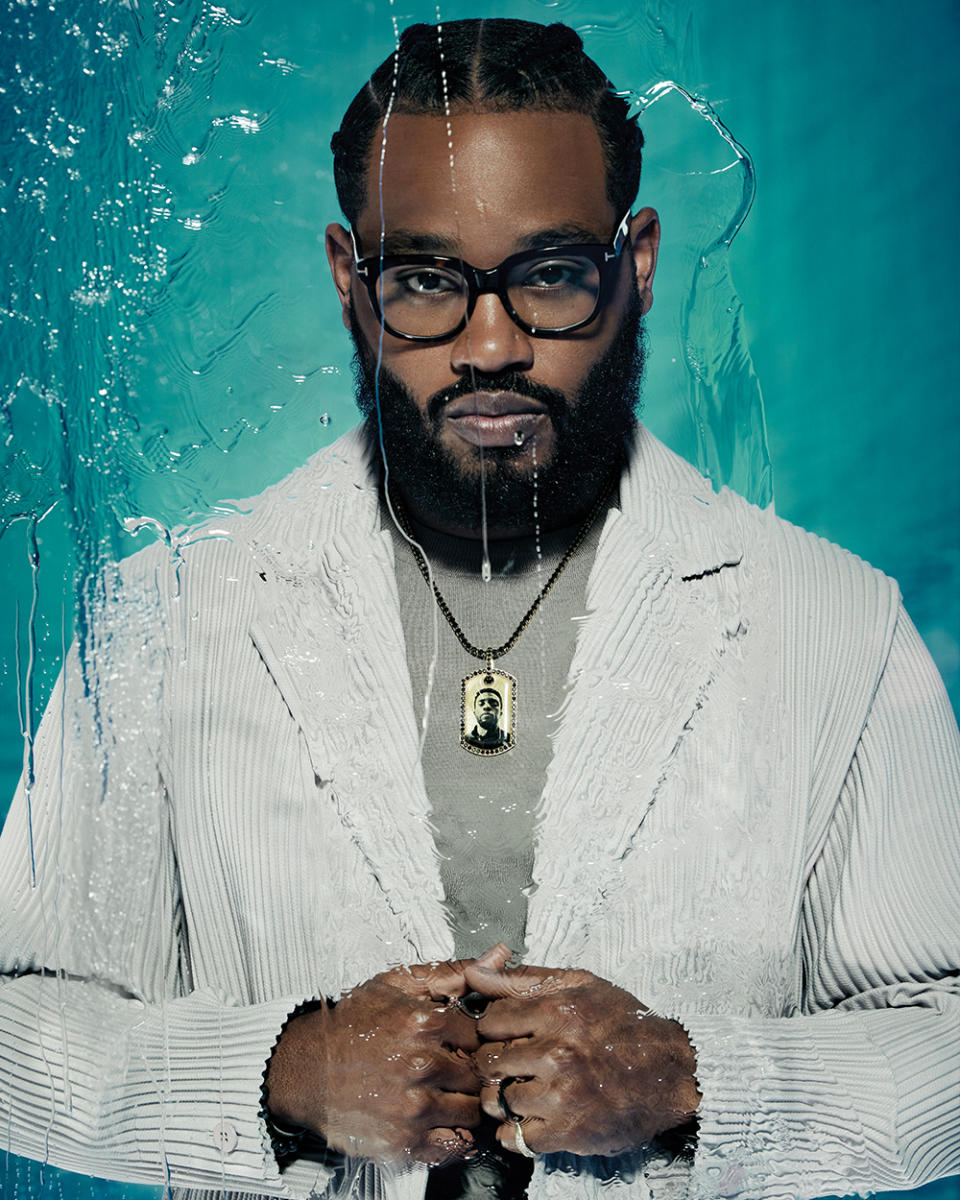
“I didn’t put the dots together,” says Wright, who plays T’Challa’s irrepressibly brilliant sister, Shuri. “Bro was very private. He wanted to always protect us. That’s all I can say.”
Adds Bassett, who plays T’Challa’s formidable mother, Queen Ramonda: “He did the thing he loved until his last breath, no excuses.”
The shock of Boseman’s death reverberated twice over for his “Black Panther” family: Not only had they suddenly lost their dear friend and colleague, but they’d also lost T’Challa, the stirring gravitational center of the franchise. What would a “Black Panther” movie look or feel like without either of them? Could one exist at all?
Answering those questions took Coogler, Wright, Bassett and everyone else connected to the film on an extraordinary odyssey riven with sorrow and brimming with creative invention. “Black Panther: Wakanda Forever” had to be at once a rousing comic book spectacle and a deeply felt tribute to its departed superhero, a gargantuan blockbuster and an elegiac farewell.
Wright and Bassett, delightful supporting performers in the first film, found themselves thrust into the sequel’s central relationship. The introduction of the aquatic Mesoamerican civilization of Talokan meant the actors had to learn how to free dive, while the story — involving a fateful clash with Talokan’s superhuman ruler, Namor (played by Tenoch Huerta Mejía) — plunged both women into far deeper and more turbulent emotional waters, all while mourning Boseman on camera and off.
“We’ve been managing it or dealing with it or growing from it or moving onward from the moment that we heard Chadwick had passed,” says Bassett via Zoom while she prepares for a run of press engagements in New York City. “It’s been two years of going through whatever cycles of grief that human beings go through.”
It would’ve been enough, really, to hopscotch across the world promoting “Wakanda Forever” while dodging spoilers — don’t worry, there aren’t any in this story — and living up to the impossible expectations set by the first film. But everyone has also had to navigate how to protect their hearts while finding the right words to express one of the most personal and painful experiences of their lives.
“It’s definitely triggering to keep discussing something that’s very close to you and really emotional,” Wright says by phone while traveling to a special presentation at the National Museum of African American History and Culture in Washington DC. “But at the same time, we understand the ways in which it could bring healing.”
Sometimes, though, there aren’t any words to say at all. By the summer of 2020, Coogler and co-screenwriter Joe Robert Cole had amassed a rough screenplay for the “Black Panther” sequel and sent it to Boseman for his feedback.
Wright chuckles about it. “I remember just hearing through the grapevine that even though Chadwick was really unwell, he was making fun of how long it was, because the script was about 300 pages,” she says. “That’s Ryan’s process; he puts everything on the page, he sends it off to Chad, and they sit and discuss.”
When asked, back in the hotel room, whether he’d had that talk with Boseman, Coogler becomes, for the first and only time, perfectly still.
“He hadn’t read it,” he says. “I found out later he was …” Coogler trails off. He clears his throat and sighs, removes his glasses, and places them on the table. “I can write this,” he says finally. “It’s harder for me to say it.”
He reaches for a reporter’s notebook on the table and writes, essentially, this: He was too tired to read it.
“That’s what was going on,” he says as he hands it back.
Coogler rubs his eyes, puts his glasses on and collects himself. “For us on that movie, the interpersonal and the professional are fused together, which happens sometimes,” he says. “It’s a human thing. We caught it with the cameras.”
As he talks, Coogler quietly lifts the notebook again and, without acknowledging what he’s doing, painstakingly scribbles over the words he’s just written, on both sides of the page, until they’ve been obliterated from the world.
“It was a real thing happening there,” he continues, speaking of the deep familial bonds built between the cast. “Specifically with Letitia and Chad, you know. Specifically with them.”
“My condolences.”
When Wright woke up in London early in the morning on Aug. 29, 2020, those were the words that greeted her on her phone, sent by someone she’d talked to the night before. “But he wasn’t clear about what he was saying ‘My condolences’ for,” Wright says. “So I was just like, ‘My condolences’ for what? What is this guy talking about?”
As she dipped further into her phones — one for the U.K., one for the U.S. — Wright waded through a flood of missed calls, emails and text messages bearing Boseman’s name, including one from her representatives asking if she wanted to send out a statement. But even after searching the internet and reading the awful news for herself, her mind refused to accept what was plainly in front of her.
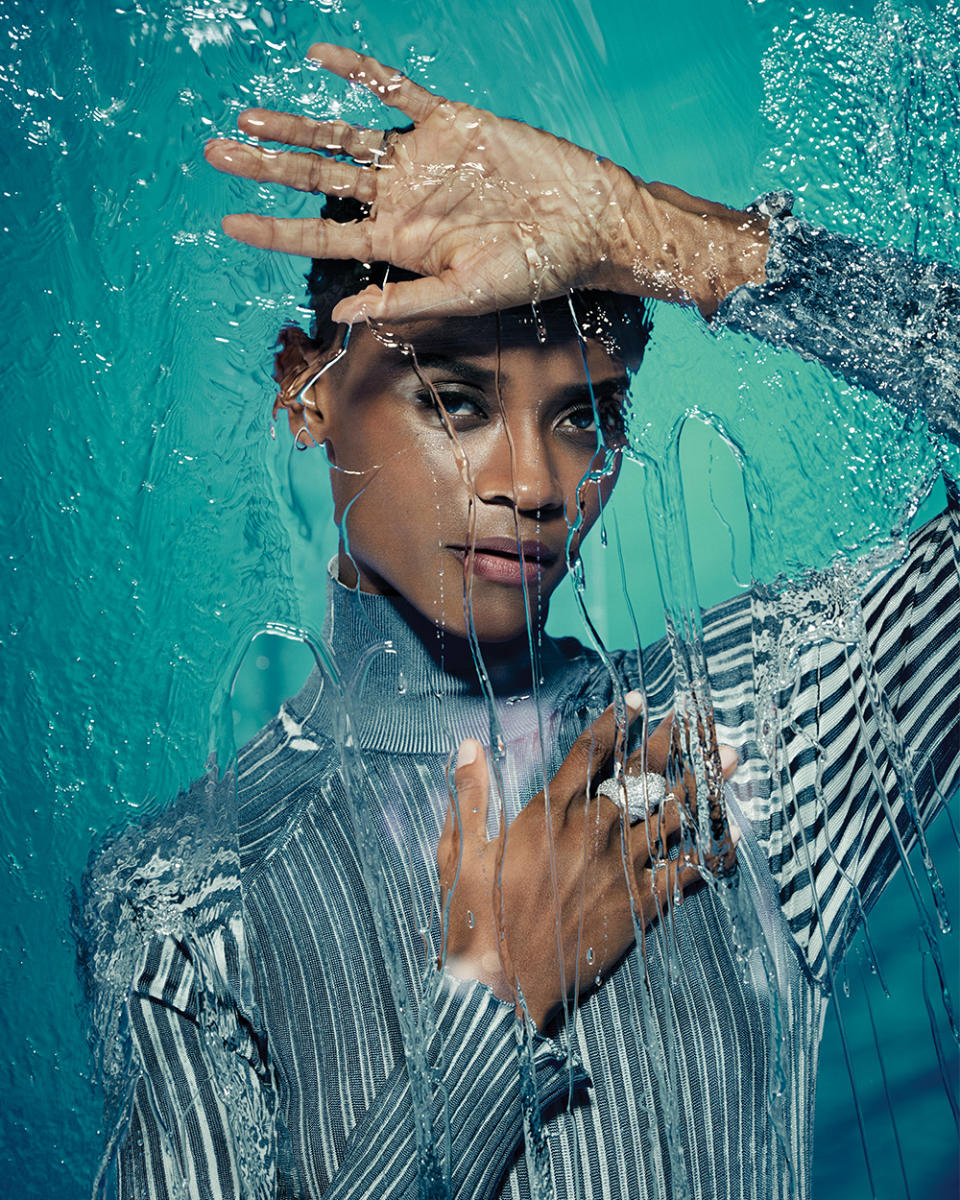
“Is someone trying to play a joke on me?” she remembers thinking. “This is not a good joke. This is not OK. And I just did the first thing that anybody would do: I called Chad.” When there was no answer, she texted the number: “Hey Bro, it’s Tish. Please pick up.”
Eventually, Wright called her “Black Panther” cast mate Daniel Kaluuya, who was also on lockdown in London.
“I was like, ‘Yo, I think everybody’s tripping right now. I’m giving you like five seconds to tell me that this is not real,’” Wright says, recounting the experience with devastating clarity, as if it happened yesterday. “He was super silent. I was like, ‘OK, fine, if you’re not gonna tell me, I’m going to continue calling Chad until he picks up.’”
As Kaluuya heard Wright calling Boseman’s number on her other phone, she remembers he said to her, “Tish, what are you doing?”
“I’m calling Chad,” she replied.
“Tish,” Kaluuya said. “His family …”
Something about those words finally hit home.
When Wright first appeared in “Black Panther” as Shuri, Wakanda’s leading technologist, her effervescent presence made her an instant fan favorite, but that was nothing compared with the impact she had on Boseman.
“Chadwick’s smile was big like a Cheshire cat, but when he became T’Challa, the smile got small — you wouldn’t see his teeth,” Coogler says. “She was the only actor who would get him to smile as Chad.” Boseman made no secret that Shuri was his favorite character, and, in turn, Wright saw Boseman as a surrogate brother.
Losing him sent Wright into what she describes as a “downward spiral.” She struggled to sleep, and though she had her family around for comfort, she was distraught that, due to the pandemic, she couldn’t travel to the private memorial for Boseman in the U.S.
“It haunted me for months that I couldn’t say goodbye to him or be around my ‘Black Panther’ family to share in that moment,” she says. “I kind of had to do that by myself. Like, bless Daniel — he came to see me and stuff. But it wasn’t enough. I wanted to book a flight that day.”
On the other side of the globe, Wright’s compatriots in L.A. were able to share in their anguish. “They were the first non-family members I had hugged since March,” Feige recalls of Boseman’s memorial. “What shocking, sad circumstances it was. And yet, as Chad had always done, and will continue to do forever, he brought us together.”
But it took several more weeks and, as Feige puts it, “a lot of soul searching” before he, Coogler and producer Nate Moore were able to bring themselves to discuss what to do with the “Black Panther” sequel. An initial discomfort with the idea of moving forward without Boseman was swiftly replaced by an even firmer conviction that they needed to do it.
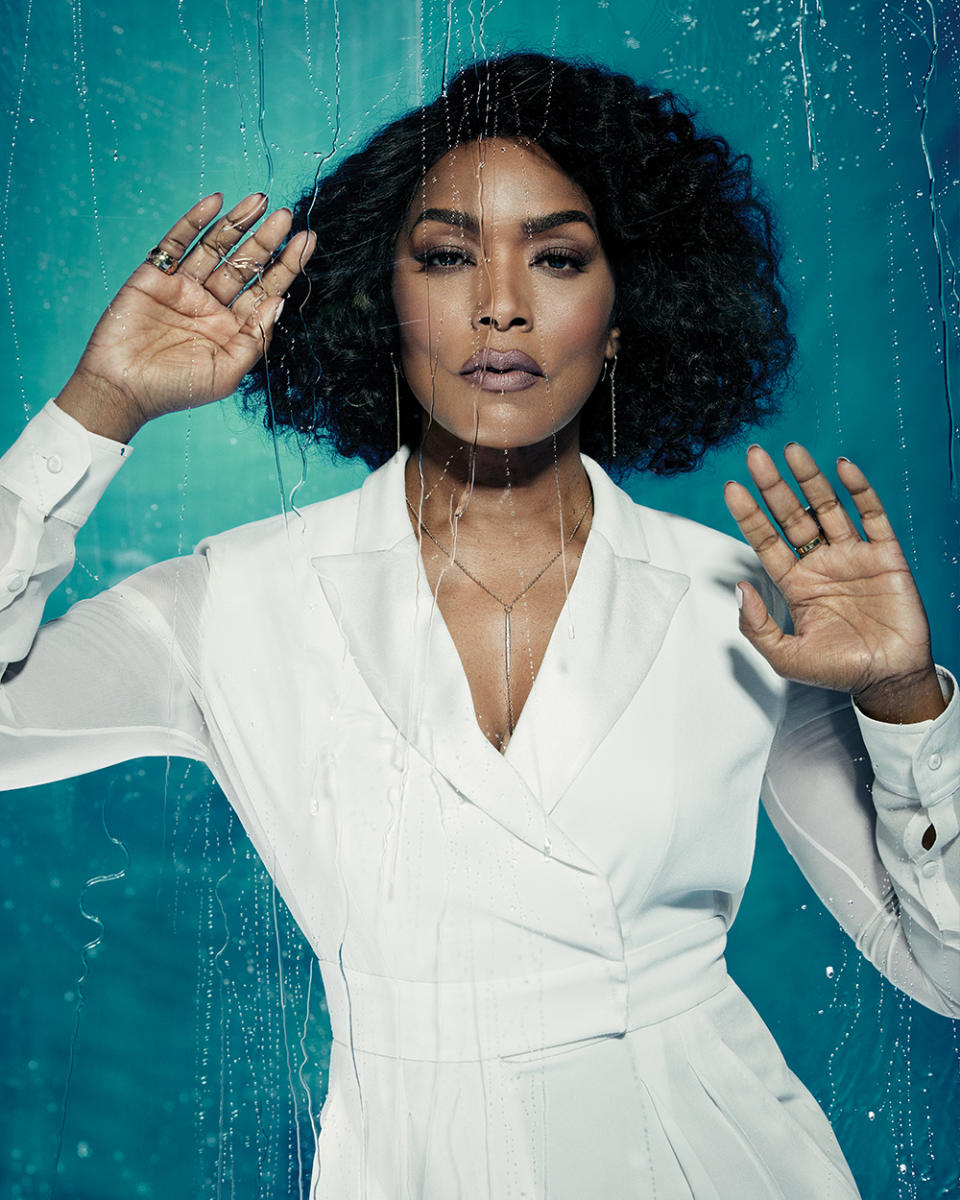
“He was such a part of the fabric of that character in that world because he helped us build it,” Moore says. “To deny people the ability to revisit that world didn’t sit right with anyone.”
Coogler’s original script with Cole contains several core elements that remain in “Wakanda Forever,” first among them Namor as the antagonist and, second, the idea that his comic book home world of Atlantis would be reimagined as Talokan, an advanced kingdom that, like Wakanda, had isolated itself for centuries as protection from Western subjugation.
“Ryan wanted to put the amount of effort and love in what is now Talokan in the same way he did with Wakanda,” Moore says. “He was looking for another culture to serve as an anchor point, and to continue the conversation thematically about colonization and what that means.”
The conflict between Talokan and Wakanda still drives the plot, but Shuri, the next heir to the throne, is now at the story’s heart, as the princess and the people of Wakanda are transformed by King T’Challa’s death. Coogler has likened it to the blast radius of an explosion: The people who are most likely scarred are the ones closest to it.
“Where we started was this idea of who would be the most affected by his loss,” Coogler says. “Shuri had never known a day without him. He’d always been there, so she would be the most unmoored by him passing away.”
While Shuri has taken center stage from her brother in the comics, that wasn’t an obvious narrative leap for her in the film. “Letitia was hired because she, No. 1, was a great actor, but No. 2, she provided a levity to the film,” Feige says. “Now the entire weight of the movie and of the kingdom of Wakanda was on her shoulders in the next movie in a way that obviously no one expected.”
While waiting on the new script, Wright buried herself in work, “hiding out in New Mexico,” she says, shooting a Western. Her coping process mirrors Shuri’s in “Wakanda Forever”; as part of the film’s overall exploration of the myriad ways people travel through loss, she disappears inside her lab rather than engage in actively grieving or finding a way to move forward.
“He found me and said, ‘We have to talk about this,’” Wright says of Coogler. “It was a gentle conversation. I said, ‘I’m going to dedicate this movie to Chad and to God, and I’m going to give my all. Whatever you need from me, I’ll do it.’ I just trusted him all the way. He believed in me all the way.”
With Bassett, Coogler was more direct, telling her how “important and vital” Queen Ramonda’s relationship with Shuri was to his new conception of the film. “Almost to the point that I was going to get a complex, like, ‘Am I going to be able to deliver what you’re asking for?’” Bassett recalls with a laugh. “She had to be strong. She had to be a mother. She had to be a leader. He was just throwing all of this at me. And then on top of that: ‘Can you swim? Can you put your head in water?’”
Needless to say, that is no small question. “You know, Black girls have this history with water and their hair,” Bassett quips. “Some of us can’t swim all that well, because it’s going to mess up that press and curl. It’s a whole thing.” Bassett’s answer was, yes, she could swim — “a little bit.”
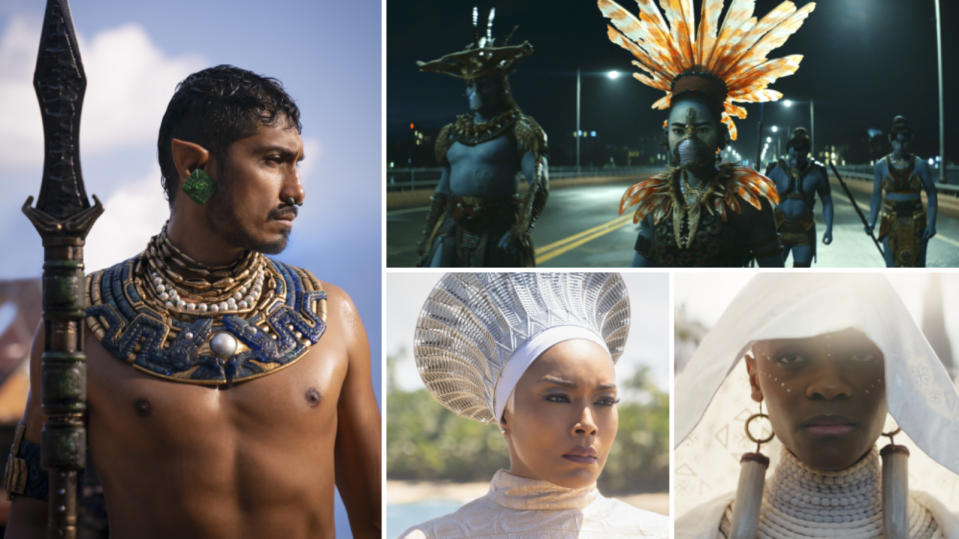
It’s not like Coogler was a born swimmer either. “A lot of us were raised to have fear of water,” he says, evoking the various reasons Black people have avoided — or ways they’ve been excluded from — pools and the ocean. But he’s the kind of director who prefers to be as close to his actors as possible, rather than stuck far away by the monitors. “If the camera’s in the water, actors are in the water, I’ve got to be in there too,” he says. “I had to figure out how to swim, so I could direct this movie.”
As is often the case with Marvel Studios productions, the screenplay was a largely fluid document from preproduction all the way through to the final cut of the film. An early subplot where the United States figured more prominently in the confrontation between Wakanda and Talokan was dialed down, while the incident that launches the third act shifted focus to different characters.
“It’s a process that’s still living and breathing — it’s not etched in stone, even as we began to shoot, even on the day of shooting,” Bassett says. “You just have to go with the flow.”
There are some moments in “Wakanda Forever,” however, that required a more unchanging script, specifically Queen Ramonda’s stunning speech, showcased in the film’s first trailer, in which she bellows that she leads “the most powerful nation in the world” and yet stands in her throne room bereft of her entire family: “Have I not given everything?!”
Bassett says she worked with a dialect coach to nail down Ramonda’s more emotional scenes. “Sometimes that accent might come and go, depending on how that emotion is flowing,” she says with a flourish. “I would try to get those monologues down so that I felt freer to play with it in the moment.”
The extra effort is already paying off: Practically from the moment the trailer first played at San Diego Comic-Con in July, Bassett has earned a steady drumbeat of awards buzz that has only grown louder as the year progresses. The attention has caught the 64-year-old actor — whose career first exploded following her Oscar-nominated performance as Tina Turner in 1993’s “What’s Love Got to Do With It” — by surprise.
“You don’t do these kinds of projects for the awards,” she says. “I appreciate the buzz on it, because I know that it doesn’t really come from these big superhero movie franchises.” (Indeed, despite “Black Panther’s” trailblazing path into Oscar history, no Marvel Studios actor has ever been nominated for an Academy Award.)
Still, Bassett says she experienced “Wakanda Forever” as “a whole, rich meal” that she found “completely satisfying” as an actor, even as it meant plumbing her own deep wells of feeling following Boseman’s passing. For her, there was never any other option. “Use it,” she says. “Make it good for something. You’re experiencing it. Don’t be ashamed of it. It’s part of life. The tears you see are indicative of the love I have — or the justice I demand or want or seek or desire.”
Her dedication to remaining utterly present was forged just before filming began in June 2021, when roughly 30 people from the original film — Coogler, Moore, the core cast and many of the crew — traveled to Boseman’s resting place in South Carolina.
“I think as a group, as a collective, it really grounded us in the moment,” Bassett says. “It grounded us in the work that was before us. And it was a balm to our spirits as we continued to mourn and tried to imagine, in our own corners, what it was going to be like to try to make this movie without him. So it brought us together and put us on the same page: We’re going to do this movie. We’re going to do it in his memory. He is still with us. And when times get rough — as they will, as they did — we are going to be as strong and resolute and resilient as he was.”
Two months later, the “Black Panther” family was tested again.
In late August 2021, Wright was in Boston, shooting a chase sequence that placed her on a “biscuit rig” that allowed the camera to shoot her riding a motorcycle in a real environment.
“It clipped a median and sheared the bike off, and it tumbled,” Moore says. Wright was hospitalized with a fractured shoulder and a concussion, among other injuries.
“I’m still processing it,” she says now about the accident. “I’m still working through it in therapy. It was really traumatic.”
As Wright was shooting with the film’s second unit, neither Moore nor Coogler was on set, or even in Boston — they were back in Atlanta on the main unit and had to hear about the accident over the phone. Talking about it still puts Coogler on edge.
“It was about how you can imagine,” he says of getting the call, his voice barely above a whisper. “I mean, I love these actors. That’s me and Chad’s little sister. Imagine getting that call that your little sister’s hurt. It’s the fucking worst thing in the world.”
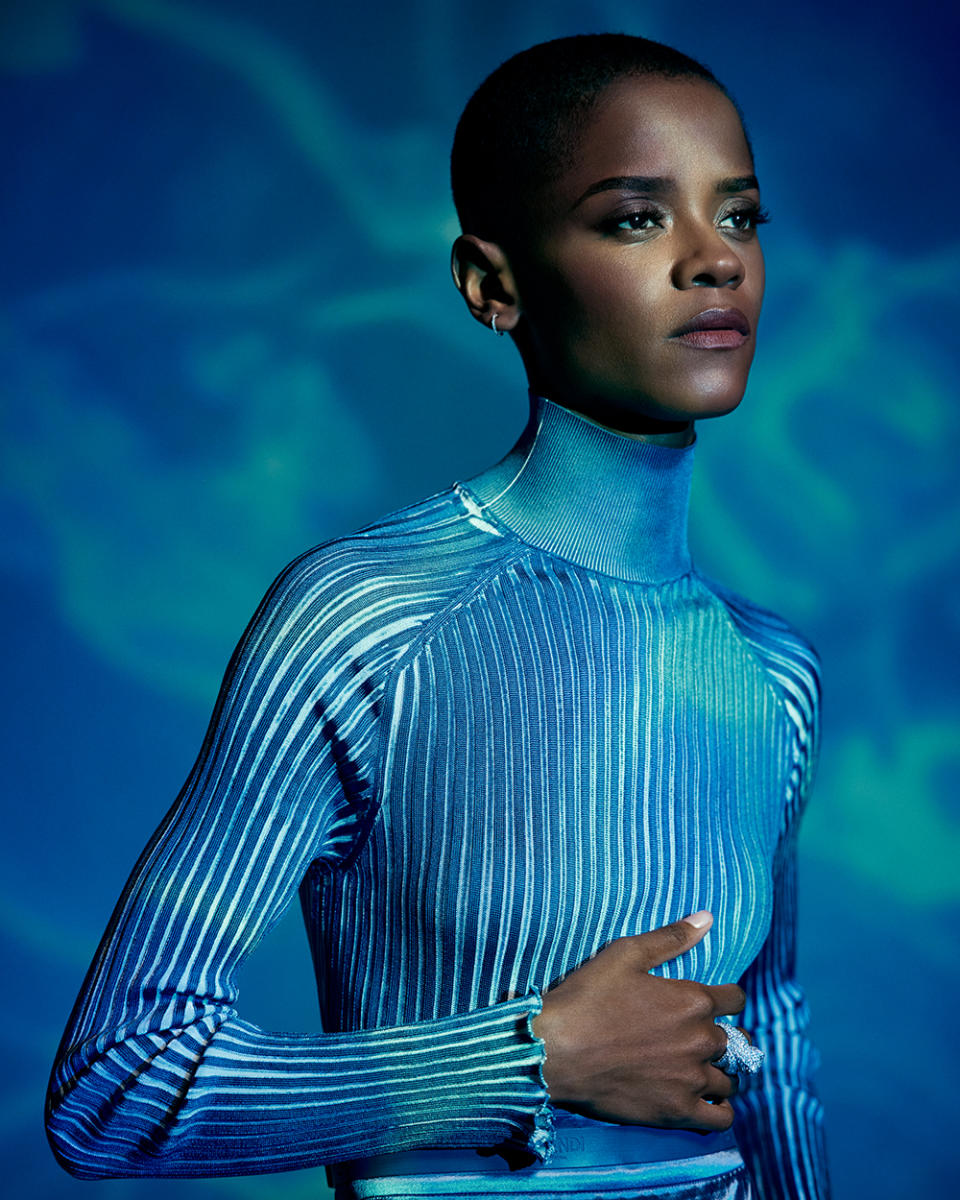
Even Feige, so famously well spoken, struggles to find the right words when discussing the accident. “It was horrifying on any production happening to anybody,” he says. “It was particularly harsh on this production that was already, uh …” He pauses before finally settling on “emotionally strained.”
Both Feige and Coogler flew to Boston to see Wright in the hospital. “I just remember wanting to finish my film, man,” she says. “I think that was one of the first things I said to Ryan. And he was like, ‘Tish, you need to recover.’”
In an effort to protect Wright’s privacy, Marvel downplayed the accident with a statement that the actor had “sustained minor injuries” and there’d be no impact on the schedule. Wright left the shoot to recover in London, and the production shifted to scenes that didn’t involve her.
Then in October, a story in The Hollywood Reporter alleged that Wright was unvaccinated for COVID-19 and had been vocally skeptical of vaccinations while on the set of “Wakanda Forever.” This followed a (now-deleted) tweet from the actor in December 2020 of a video of someone expressing skepticism about the vaccine. A week after the THR report, Wright posted to Instagram that the article was “completely untrue” without directly addressing her vaccination status. But another story in November posited that CDC regulations might prevent Wright from returning to Atlanta to continue filming — if she was, in fact, unvaccinated.
Bassett says that she never heard Wright discuss vaccines while making the film, and Moore says he never asked her about her status, and still doesn’t know it, contradicting reports that the cast was required to be vaccinated.
“It’s not a question we asked of anybody, to be quite honest,” Moore says. “She never talked about her views either way. We read the stories that I would argue were unfair, because I don’t know where they’re coming from. As someone who literally is on set next to the monitor all the time, I feel like I would have heard it.”
When Variety asked Wright about the reports surrounding her vaccination status, her publicist interrupted the call to insist the interview move on to the next question. The following day, Wright’s representative said the actor would respond to emailed questions, including ones regarding the reports about her vaccination status; two days after the questions were sent, however, the rep said “schedule changes” prevented Wright from responding, and directed Variety to her Instagram statement from 2021.
For his part, Moore is adamant that Wright’s vaccination status had no effect on the film. “She only ever was the utmost professional and a joy to have around,” he says. “She didn’t cost us a moment. I mean, her injury was the thing that cost us, and that was no fault of her own.”
By November 2021, it was clear that production needed to shut down while Wright finished recuperating back home in London; it picked up again in January 2022. Over her four-and-a-half-month recovery, Wright focused on getting stronger, but even when she was back on set, she says that post-concussion syndrome was a factor.
“I had great, great, great medical support, great patience on set,” she says. “I’m just extremely proud of myself. I’m extremely proud of Ryan, of the team, for just the resilience — overcoming adversities every step of the way.” She adds, “When I finished filming, I cried like a little baby.”
Coogler’s time in Wakanda isn’t over yet. His production company, Proximity Media, is developing multiple series set within the African kingdom for Disney+, and it is producing “Ironheart,” the spinoff starring Dominique Thorne’s Riri Williams, who is introduced in “Wakanda Forever.” But just asking about whether he’s keen to direct a third “Black Panther” movie, or the highly anticipated “Avengers: Secret Wars,” elicits a weary sigh.
“I can tell you definitively I have no idea what I’m doing next,” he says. (For the record, Feige says there have been “conversations” about a third “Black Panther” film with Coogler, but they have not discussed “Secret Wars.”)
Instead, Coogler says he’s focused on getting “Wakanda Forever” out into the world, which he sees as his final obligation as a filmmaker. “It’s very difficult because you’re exhausted and emotionally spent, and I’m trying to give it all my full attention,” he says. “After that, I’ll figure out what’s going on with me. But I think it’s going to be some rest and family time.”
Since Boseman’s death, Coogler’s job has been about his grief and everyone else’s — an ever-present reminder of his friend’s absence. There’s a scene in “Wakanda Forever” in which a character talks about giving themselves the time and space to “break” over the death of T’Challa. But Coogler hasn’t had that opportunity; he’s not sure it really exists.
“That’s a movie,” Coogler says of the scene. “I don’t know if there’s such thing as, you can go away, take enough time, and come back and it’s OK — you don’t miss your friend no more. You know what I mean? I don’t know that that’s how it works. It’s an ongoing process. The process needs to change from time to time. I got a bad back, right? I could get the most comfortable, most ergonomic chair in the world. If I sit in it long enough, my back’s going to hurt. I have to get up and switch positions.”
At the world premiere for “Wakanda Forever” on Oct. 26, Coogler wore a dog tag with a photo of Boseman on a sparkling black and gold chain, which he’d had made before filming began.
“Everybody honors their dead in their own cultural ways,” Coogler explains. “I’m a Black man. I come from where we put our dead homies on T-shirts or on talismans or something that you can keep with you. Dog tags felt appropriate for him because he was a fighter, a soldier in many ways.”
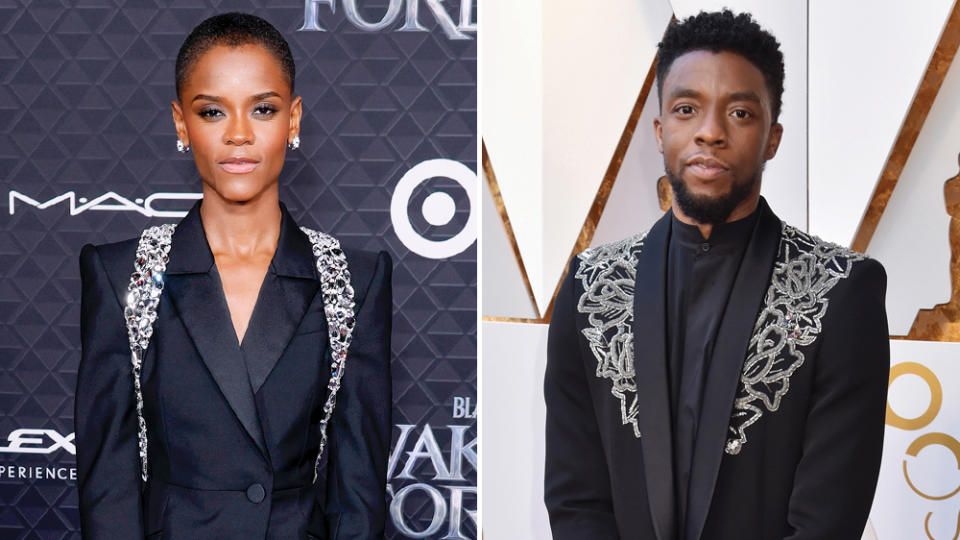
Along with his wife and producing partner, Zinzi Coogler, he sat in the same row as Boseman’s widow, Simone Ledward Boseman, and the rest of the late actor’s family. Wright, meanwhile, wore a custom Alexander McQueen suit jacket that mirrored the suit Boseman wore to the 2018 Oscars. Watching the movie itself — the first time any of the cast had seen the finished film — Bassett says she was struck by how much Boseman is “really a presence in the film, woven into the fabric of it seamlessly, beautifully.”
With all that emotional weight inside the Dolby Theatre that night, it would be easy to see the “Wakanda Forever” premiere as a chance for a massive catharsis, for everyone involved to finally release the high-wire emotions they’ve carried throughout the film’s creation.
Coogler did savor the experience of watching along with the audience and absorbing their reaction for the first time. But surrounded by thousands of people experiencing a story that had so totally consumed his life for so long, he couldn’t quite believe it was happening.
“I was wondering if I was really even there,” he says with a chuckle. “In the process of these four years, there’s been a lot of ups and downs. A lot of times where you couldn’t see the light at the end of the tunnel. You just had to trust that eventually you’re going to get out of it.”
Set Design: Edward Murphy/Consolidated Soup
Best of Variety
Sign up for Variety’s Newsletter. For the latest news, follow us on Facebook, Twitter, and Instagram.

